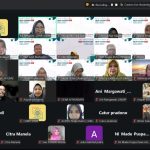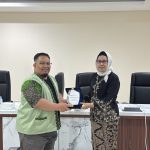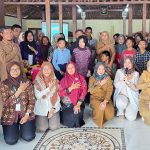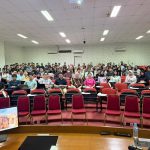Wednesday, February 9, 2022, the Center for Bioethics and Medical Humanities (CBMH FKKMK UGM) again held the Raboan Discussion Forum. On that occasion, the theme raised was Modern Paradigm in the Field of Science and Technology, Government and Social Life System that Has Been Implemented in the Classical Javanese Era Medang I Bhumi Mataram. The theme was presented by the speaker: Ki Dr. Budiono Santoso Setradjaja, PhD., Sp.FK. The virtual discussion forum is led by Moderator: dr. Nur Azid Mahadinata.
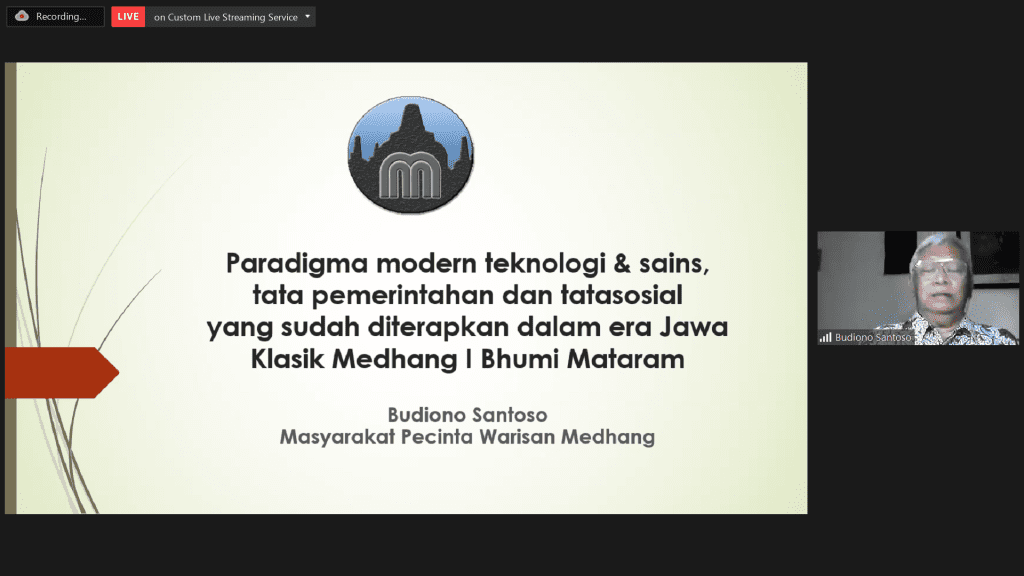
Dr. Budiono thought that in recent society there were misconceptions about the quality of human technology during the Medang Mataram kingdom which had spread systematically and from generation to generation. An example is the story of the construction of a temple that was built mystically with an unexplainable logical framework. According to Dr. Budiono, this could result in the erosion of the current generation’s confidence in the abilities and capacities of their ancestors in terms of knowledge and technology. Even though the ancestors during the Medang Mataram kingdom had abilities in the fields of technology, science, and governance that were no less than the modern era. So it is very important to straighten out these myths and spread the truth about what happened to preserve and protect material and intangible relics of the Medang Mataram kingdom.
The Medang Mataram Kingdom is famous for its material heritage which can still be seen today. Among them are Borobudur Temple (Bhumi Sambara Budhara) & Prambanan Temple (Ciwagraha). The two temples have been recognized by UNESCO as World Cultural Heritage since 1991. From the construction of the Borobudur temple, three important lessons can be learned, namely the leap in the mastery of technology, consistency of policies across generations, and consistency and precision of technology.
“Medang leaders have a far-sighted vision. Approximately 70 years ago, Medang leaders decided to build a colossal architecture that could last thousands of years,” said Dr. Budiono.
Based on the research of Ir. Hadiwaratama, MSc. E revealed that the architecture of the temple was designed with the scientific principles of binary-coded mathematics so that it is always symmetrical. Binary numbers are also like those that appear in literature and batik works.
Not only building technology, during the Medang Mataram era, the people also had marine transportation technology in the form of outrigger boats. Based on the findings of Prof. Dr. Umar Anggara Jenie, Apt, Msc, the sailors’ outrigger boats were able to reach mainland Southeast Asia, Africa, and the Pacific. At that time Medang was a rich maritime and agrarian kingdom that had trading commodities of cinnamon, cardamom, rice, spices.
In the field of governance, the Medang Mataram kingdom runs a unitary state power system. This is like a democratic system originating from western countries which are now used in the modern era. In the era of Medang Mataram, various levels of government were found that were autonomous and decentralized.
During the Medang Kingdom, the concept of gender equality was also known. This can be seen from the election of female leaders such as Ratu Shima from Kalingga, Pramodhawardhani from Medang, Sri Isyana Tunggawijaya from Medang and Tribhuana Tungga Dewi who was the political architect of Majapahit.
According to Dr. Budiono, several steps need to be taken so that the conservation and protection of the Medang Mataram heritage can continue to be carried out. Among them are by conducting studies and publications on the classical Javanese Medang era, commemorating the history of the founding of the Medang Mataram kingdom on October 6, Proposing the commemoration of Archipelago Culture Day every October 6, holding the Pramodawardani & Raka I Pikatan Ballet performances, making book publications about the Characters Women of the Classical Javanese or Nusantara Era.
Download the material here
Power Point – Paradigma Modern Teknologi, Sains, Sosial Era Medang
Watch the full video here

